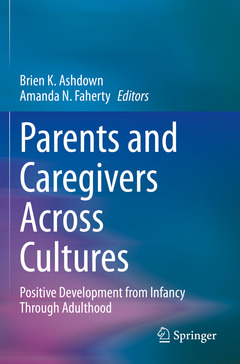Description
Parents and Caregivers Across Cultures, 1st ed. 2020
Positive Development from Infancy Through Adulthood
Coordinators: Ashdown Brien K., Faherty Amanda N.
Language: English
Subjects for Parents and Caregivers Across Cultures:
Keywords
parenting practices as cultural practices; children's developmental outcomes; culturally-valued outcomes in children; multicultural parenting strategies; historical; political; and cultural forces influencing parenting; parenting adult children and grandparenting; child socialization goals; child gender ideology and gender development; parenting and child development; psychology of parenting
Publication date: 02-2021
Support: Print on demand
Publication date: 02-2020
307 p. · 15.5x23.5 cm · Hardback
Description
/li>Contents
/li>Biography
/li>Comment
/li>
This book explores diverse parent-child relationships from around the world, drawing on connections between culture and parenting values and challenges. It identifies parenting practices within various countries? unique historical, political, and cultural backgrounds, reframing parenting as a cultural process whose goals are to encourage culturally-specific child behaviors and outcomes. Chapters focus on parenting research in a range of countries, such as Australia, Bolivia, China, Egypt, Guatemala, India, Rwanda, Namibia, Saudi Arabia, and the United States. Chapters also discuss social, emotional, and physical developmental topics throughout the lifespan, including infancy, early childhood, adolescence, emerging adulthood, and adulthood.
Topics featured in this book include:
- The link between cultural differences in academic success to parents? academic socialization practices.
- The impact of culturally-specific parental engagement in positive developmental outcomes in children.
- Transgender children and their parents.
- The relationship between religious and secular values and their influence on creating polygamous teenagers.
- How to implement a micro-cultural lens to studying parent-child relationships during emerging adulthood.
- Differences and similarities in grandparenting among different cultures.
Parents and Caregivers Across Cultures is a must-have resource for researchers, professors, graduate students as well as clinicians, professionals, and policymakers in the fields of developmental and cross-cultural psychology, parenting and family studies, social work, and related disciplines.
Chapter 1 - Introduction: What Do We Mean When We Talk About Good Parenting?.- Part I: Infancy and Toddlerhood.- Chapter 2 - Rwandan Infant Caregiving: Promoting a Culture of Peace.- Chapter 3 - Parenting in an Uncertain World: African Humanitarian Migrant Resettlement in Victor, Australia.- Chapter 4 - Understanding Navajo Parents’ Beliefs about Cradling and Early Mobility Practices.- Part II: Childhood.- Chapter 5 - You Don’t Have to Know Where Your Kids Are, Just Where They Aren’t: Exploring Free-Range Parenting in the Bolivian Amazon.- Chapter 6 - Academic Socialization and Parenting Practices: A Comparison among Chinese and American Preschoolers.- Chapter 7 - Parenting and Academic Socialization of Young Children: Sociocultural Context for Early Childhood Development in South Asian Families.- Chapter 8 - Unspoken Expectations: Children’s Academic Achievement in the Beliefs of Asian Indian Hindu Parents in the United States.- Chapter 9 - Chinese Parenting and the Collective Desirable Path through Socio-Political Changes.- Chapter 10 - Parenting Far from the Tree: Supportive Parents of Young Transgender and Gender Nonconforming Children in the United States.- Chapter 11 - Parenting Adolescent Girls and Boys in Guatemala.- Chapter 12 - Parenting into Two Worlds: How Practices of Kinship Fostering Shape Development in Namibia, Southern Africa.- Chapter 13 - Theological Parenthood, Demographic Restraints, and the Making of the Good Polygamous Teenager.- Part IV: Emerging Adulthood.- Chapter 14 - Emerging Adulthoods: A Micro-Cultural Approach to Viewing the Parent-Child Relationship.- Chapter 15 - Parents and Emerging Adults in India.- Chapter 16 - Parenting Practices in Saudi Arabia: Gender-Role Modeling.- Chapter 17 - Egyptian Rearing Practices: Takafol and Observance of Family Rituals.- Part V: Other Types of Childrearing.- Chapter 18 - Reimagining the Village: Alloparenting and Community Involvement among the Childfree.- Chapter 19 - Grandparenting Across Cultures.- Chapter 20 - Australian Intergenerational Families Valuing the Great Outdoors: A Tapestry of Children’s Cultural Learning through Specific Parenting Practices.
Brien K. Ashdown, Ph.D., is an Associate Professor of Cultural Psychology in the Department of Psychological Sciences and an affiliated faculty member of the Latin American Studies Program at Hobart & William Smith Colleges in Geneva, NY, USA. He graduated with his doctorate in cultural and developmental psychology from Saint Louis University in 2009 (with a doctoral minor in research methods and statistics), and spent two years as an Assistant Professor at the University of Alaska Fairbanks before moving to Hobart & William Smith. He regularly teaches courses in cultural psychology (including Introduction to Cultural Psychology, Topics/Seminar in Cultural Psychology, and Research Methods in Cultural Psychology), Adolescent Development, Statistics and Design, and Introductory Psychology.
He has authored or co-authored nearly 30 empirical articles and book chapters, and been an author on more than 60 conference talks and posters. He’s a formal Participating Member of the Rohner Center for the Study of Interpersonal Acceptance and Rejection, and received early career awards from both Division 52 (International Psychology) of the American Psychological Association and the Society for Cross-Cultural Research. Finally, he currently serves as president of the Society for Cross-Cultural Research (2019), president-elect of the International Society for Interpersonal-Acceptance Rejection, and the Executive Director of Education for the Children USA.
Amanda N. Faherty, B.A., is a doctoral student in Developmental Psychology in the Hiatt School of Psychology at Clark University in Worcester, MA, USA. She is currently working under the mentorship of Dr. Jeffrey Jensen Arnett, Ph.D. Her research investigates broad and microlevel sociocontextual influences on the parent-emerging adult (EA) child relationship and development during emerging adulthood with particular
Provides a multicultural perspective on parenting practices around the world
Includes research from a wide range of countries including Saudi Arabia, Guatemala, China, the US, and more
Situates parenting strategies and values in the context of specific historical, political, and cultural forces




